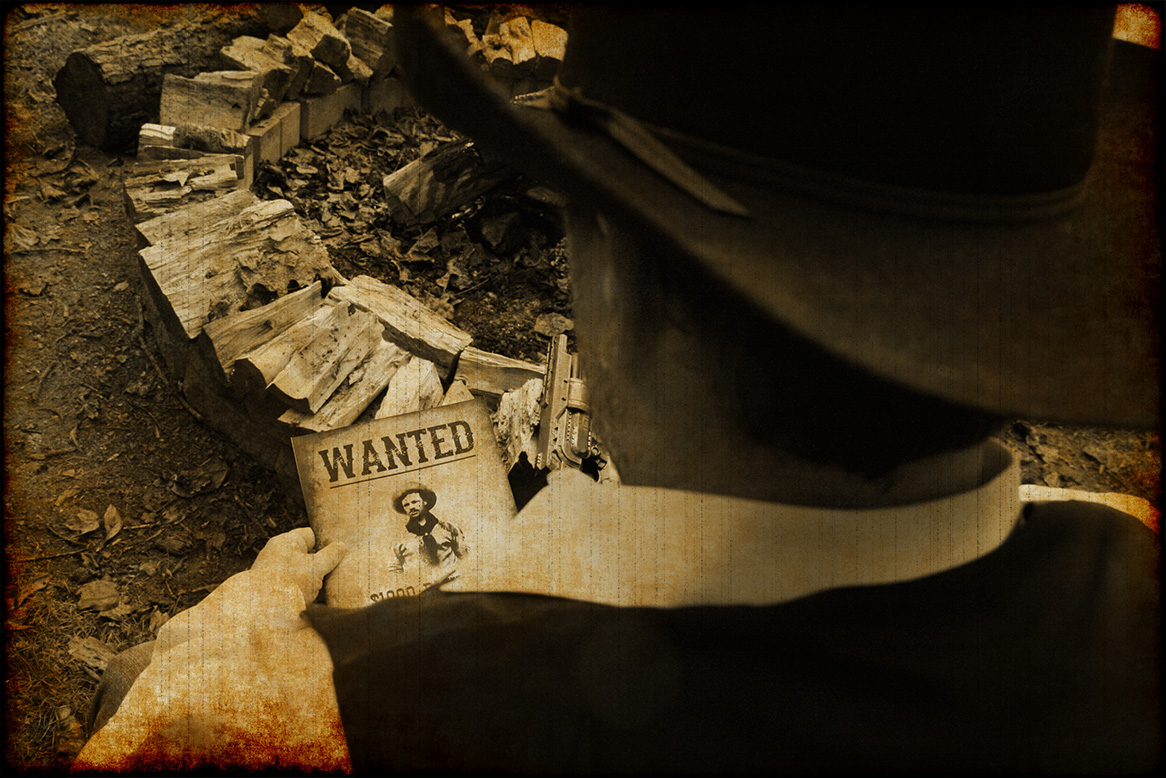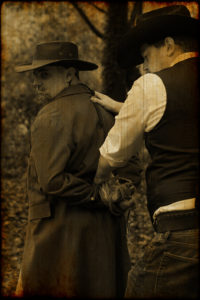
Marshals
Both the Federated States and League of American States use a national marshal service. Marshals have been employed in the states since 1789. Unlike sheriffs, their jurisdiction extends beyond county lines. Their authority covers everything within their assigned territory. Their duties generally include the disbursement and accounting for monies used in running the national courts, the transfer of prisoners, and the pursuit of criminals across state lines. They work on a fee system, collecting set amounts for performing certain tasks. They have the power to appoint deputy marshals when needed.
Texas Rangers
Texas Rangers perform untold services in their respective states. Some of their duties include protecting life and property, handling special criminal investigations, quelling disturbances, serving as officers of the court at a judge's request, and suppressing criminal activity in any area where local officials are unable or unwilling to maintain law and order. Their authority extends through their entire Republic and is not curtailed by city or county boundaries. Directly under the governor, they sometimes act as an army, while in other cases, more like a police force.
The Texas Rangers were organized in 1823 by Stephen Austin and a group of men eager to see the frontier protected. Each ranger furnished his own horse and firearm. They handle the toughest of assignments, often in conflicts where they are severely outnumbered. They have been a determining factor in the Republic’s ability to withstand the Aztec Empire. Some rumors persist that the Rangers have been used to track down unnatural things in the remote areas of the Republic since the Calamity.
Sheriffs
Sheriffs date back to medieval Europe, and continued into Colonial America. The privileges awarded sheriffs by the various States and Nations vary widely. Their jurisdiction is typically limited to the county in which they serve, their primary duties being to keep the peace, uphold the law, and maintain the jail. In the Federation and League states, they act in conjunction with Marshals but with limited authority.
Pinkertons
Pinkerton Agents are detectives who work for Allen Pinkerton in his agency formed in 1850. Their logo is the image of an eye, their motto, "We Never Sleep," which is where the term "private eye" originates. The Pinkertons have numerous private contracts often working for railroad companies, mining tycoons, and land barons.
In 1861, while investigating a railroad case, the agency uncovered and foiled a plot to kill President Lincoln. In 1862 President Lincoln employed the agency to provide protective and espionage services for the Federation, a contract that continues on today. They operate openly throughout the Federation and under cover across all of the North American nations. They sometimes use heavy-handed methods, such as when quelling mining strikes, which has made them enemies among the working class.
Bounty Hunters
 Bounty hunters are often considered as bad as the people they are hunting, probably because of a few rogues known for killing folks wanted dead or alive to collect the bounties on them. Many serve as deputy marshals when needed, while others work with sheriffs in apprehending criminals, freeing the marshal or sheriff to focus on normal duties. They are best known for tracking down bail jumpers and fugitives with a price on their head. New Orleans and Chicago both boast a large number of bounty hunters, these towns being on the Mississippi and having significant criminal influence in the local government.
Bounty hunters are often considered as bad as the people they are hunting, probably because of a few rogues known for killing folks wanted dead or alive to collect the bounties on them. Many serve as deputy marshals when needed, while others work with sheriffs in apprehending criminals, freeing the marshal or sheriff to focus on normal duties. They are best known for tracking down bail jumpers and fugitives with a price on their head. New Orleans and Chicago both boast a large number of bounty hunters, these towns being on the Mississippi and having significant criminal influence in the local government.
In 1872, the Federation Supreme Court ruled that bounty hunters were a part of the FSA law enforcement system with a decision in Taylor v. Taintor: When the bail is given, the principal is regarded as delivered to the custody of his sureties. Their domain is a continuance of the original imprisonment. Whenever they choose to do so, they may seize him and deliver him up to his discharge; and if it cannot be done at once, they may imprison him until it can be done. They may exercise their rights in person or by agent. They may pursue him into another state; and if necessary, may break and enter his house for that purpose. The seizure is not made by virtue of due process. None is needed. It is likened to the arrest by the Sheriff of an escaped prisoner.
Law Dogs in The Territory
Though they have fractured into separate nations, the Federation, League, and Republic all share a similar governmental and legal system stemming from the Constitution. The Territory does not recognize those concepts in the same manner.
Social misfits of all sorts, some evading the law or unwanted families, are drawn to the western frontiers. The violent and lawless West, with its heterogeneous population, requires powerful and unique personalities to deal with the complex issues of turbulence and crime.
Before the Calamity, the provinces of The Territory were known to be dangerous and often lawless places. Some towns elected sheriffs, resulting in colorful and dramatic personalities who assumed the roles of law enforcers, characters like "Wild Bill" Hickok, Dallas Stoudenmire, Bat Masterson, Pat Garrett, William “Bill” Tilghman, William Brenkenridge, Commodore Perry Owens and John Slaughter. Men and women of violence, there is a fine line between them and the people they were protecting their towns from.
Unlike their counterparts in the other nations, their jurisdiction is limited to their town and its immediate surroundings. Their primary duties include keeping the peace, upholding the law, and maintaining the jail. Sheriffs can appoint deputies and form a posse at their discretion. Sheriffs will often dispense justice for minor criminal activities, but serious offenses are deferred to the Territory Judges and their Marshals.
The Company assigned Territorial Circuit Judges to hear cases and mete out justice. These Judges were ruthless agents of the law, with a preternatural ability to track down wrongdoers and see them dealt with. Each judge would appoint a posse of Territory Marshals to assist them in their duties. The most colorful of these Judges was Isaac Parker, the Circuit Judge for the Arkansas Province. He was known as The Hanging Judge due to the large number of convicts he sentenced to death.
Generally speaking The Company seems to value independence and only steps in at seemingly random events, or when their people and interests are threatened.
Personal disputes in the The Territory are often resolved by a traditional code duello. Often fought over issues of personal honor, these duels are highly formalized means of solving disputes between parties with swords or guns. The first known quick-draw duel was conducted by Davis Tutt against Wild Bill Hickok on July 21, 1865 in Springfield, MO.

